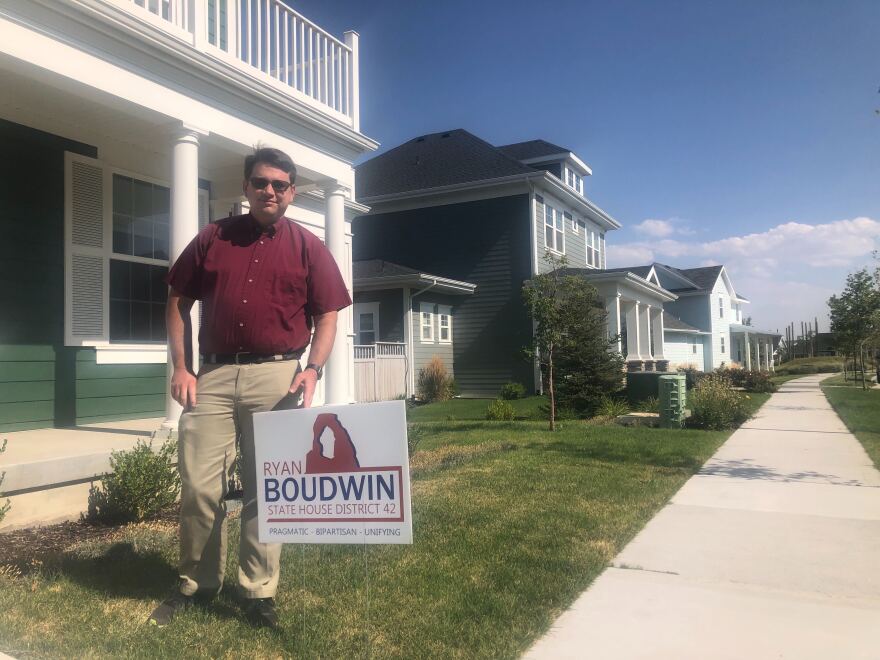Republican presidential candidates are usually very popular in Utah, but in 2016 many party members rejected nominee Donald Trump and defected to support third-party candidate Evan McMullin instead.
The next year, a group of Utahns formed the new, moderate United Utah Party, to capture the momentum of those disaffected Republicans.
But three years later, the party has yet to put a candidate in office.
36-year-old Ryan Boudwin wants to be the first. He is running for the state House of Representatives to represent District 42, which covers parts of Western Salt Lake County.

Boudwin lives in South Jordan with his wife and their three sons. On a recent afternoon, the former police officer and current tech company recruiter settled into a black desk chair in his home office — which doubles as his campaign headquarters — wearing a face mask emblazoned with his campaign logo and the United Utah Party logo.
“I had been a Republican my whole life and I'd always kind of identified as a moderate Republican,” Boudwin said.
But then, two things happened. First, Donald Trump became the party’s presidential nominee.
“I felt like he was taking the party in a direction that I was simply not willing to go, especially with the anti-immigrant rhetoric,” Boudwin said.
Second, Boudwin said he witnessed extremism and in-fighting in the Utah Republican Party when he was a state delegate, especially over a law that allowed candidates to qualify for the ballot through signature gathering.
Then in 2017, he went to a house party for a candidate running under the newly formed United Utah Party.
“It was wonderful, because I felt like I finally had a political home,” Boudwin said. “I think we need more leaders who are pragmatic and willing to embrace good ideas without worrying about what team they came from.”
Boudwin felt so strongly about that political philosophy that he decided to run for office.
Even though third parties typically struggle to get candidates elected, Boudwin said that he has a good shot at winning. In 2018, the United Utah Party candidate for this district got 33% of the vote against a Republican incumbent, with no Democratic candidate. This year, it’s an open seat, and there’s both a Democrat and new Republican on the ballot.
“There's a full 40% of this district that is unaffiliated,” Boudwin said, citing the party’s analysis of the state’s voter roll. “I think that a lot of those people are looking for somebody who is going to be more pragmatic and willing to work with both parties to get problems addressed.”
It takes time for political parties to gain traction, said Mary Bennett, director of the Leavitt Center for Politics and Public Service at Southern Utah University.
“It’s not fast,” Bennett said. “You've got to have a good number of years of fielding solid candidates. You've got to do the groundwork, the door-to-door campaigning and getting out there ... A third party is overcoming huge obstacles.”
Money is one of those. The two major parties have national organizations supporting them, “and so you've got a fundraising channel set up right there,” Bennett said. “So forming a third party … it’s very difficult to fundraise and to find funding to be able to compete on a level with the Democrats or Republicans.”
Another obstacle is convincing voters to leave a party they’ve identified with for a long time.
“You sign up with a team and it's a really big mental exercise to take yourself off that team and join a new team,” Bennett said.
The 2018 midterm election was essentially the United Utah party’s first chance to field candidates. Since presidential elections generally have better turnout, Bennett said, this election is an important litmus test for the party.
“The voter turnout and the number of votes that these candidates get will really be indicative of the strength of that movement,” she said.
These challenges are something United Utah Party Chair Richard Davis said he hears from voters.

“When it comes down to actual voting, many people will say, ‘Well, I agree with you, I like you, but I don't want to waste my vote,’” Davis said.
Only 1,905 active Utah voters are registered with the party, about 0.1% of the state’s total active voters and fewer than any other third party in the state.
Despite that, Davis is hoping the United Utah Party’s strategy of focusing mainly on smaller races, like state House or county commission, will help put one of their candidates in office.
“We know we can't spend the resources doing a full scale congressional or statewide race,” he said. “So this is very different from what these third parties have done in the past. You start with the presidency and you lose. And we're not doing that. We're starting from the bottom up and trying to build a structure.”
While that might not be as glamorous, Davis said, he thinks it could be their ticket to success.
Boudwin, who’s running for the state House, thinks so too. He said the United Utah Party has the chance to make a big impact, but it will take time.
“We need to get started here,” he said. “I wanted to be part of the solution. So that's why I chose to stand up and run.”


